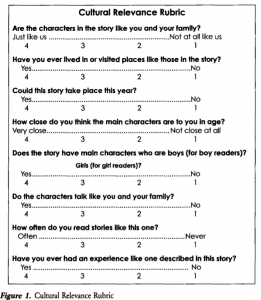Power of Cultural Relevance for Learning and Student Success
Research indicates that when students are exposed to culturally relevant curriculum, they experience greater learning gains. Students from other cultures, particularly english language learners (ELLs) experience great difficulty when coming to the United States and having to assimilate to a culture that is different from their own. In addition to language, ELL students and students raised in bilingual households, often face gaps in cultural knowledge that make it more difficult to pass reading comprehension exams.11 Students come into school with their own “schemas”, or models for understanding how systems and relationships work. Since schemas depend on culture and upbringing, students who have backgrounds that differ from main stream culture will often have trouble understanding behaviors or norms that occur inside classrooms and text books.11
In order to ensure every child can succeed academically, regardless of cultural or racial background, it is imperative for schools to recognize the different levels of cultural competence that exist within students. ELL students responded to culturally relevant books with higher levels of engagement and scored higher on reading comprehension tests than books that lacked cultural relevance. 11 Research indicates that if students engage with a variety of cultures, regardless of it is their own, they will experience better “social, cognitive, and democratic outcomes.”2 Additionally, in Tucson Unified School District (TUSD), students who engaged in the Mexican American Studies program were more likely to graduate and more likely to past the state standardized test than students who did not take an ethnic studies course. In fact, students who participated in MAS courses scored higher on all five measures of academic success than their peers who did not take MAS courses. 2 Researchers feel that programs such as MAS could help close achievement gaps and prevent Latino/a students from dropping out of school.
It is important to note that “cultural relevance” does not simply mean that the characters in the book or non-White or that a few Spanish catch phrases are dropped. In fact, there are books on the market that serve to perpetuate cultural stereotypes and are not authentic representations of the racial groups they are meant to represent.11 Teachers, administrators, and policy makers must consider the social-cultural-economic influences at play within the text. Below is a scoring chart to help students and teacher assess the cultural relevance of a text11:

While acquiring culturally relevant materials costs money and developing ethnic studies courses is a challenge, research suggests that the benefits and gains for students are well worth the investment. Since ELL students experience better reading comprehension when books are culturally relevant, and students experience higher graduation rates when they are exposed to classes that validate and include their culture, the need to incorporate cultural relevance is an imperative.11,2